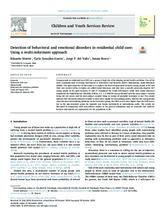Abstract
Young people in residential care (RC) are a group at high risk of developing mental health problems. One of the most commonly-used screening instruments is Achenbach and Rescorla (2001) dimensional, multi-informant ASEBA. The main objective of this study is to analyze the level of agreement between young people in RC and their care workers (who, in Spain, are called social educators, and who have a specific university degree). 617 young people in RC aged between 11 and 17 completed the Youth Self Report, while their social educators completed the Child Behavior Checklist (CBCL). A 2x2 ANOVA was performed with the intra-subject variable being the test scores and the inter-subject variable being in receipt of specialist treatment or not. The results indicate that the social educators tended to score more highly in externalizing scales, whereas the young people reported more internalizing problems. In the treatment group, the CBCL scores were higher than the YSR scores, but in the non-treatment group the opposite was found, particularly in internalizing scales. The results are discussed in comparison with concordance studies in the general population and we conclude that multi-informant instruments are appropriate for the population in RC.
View article here.

